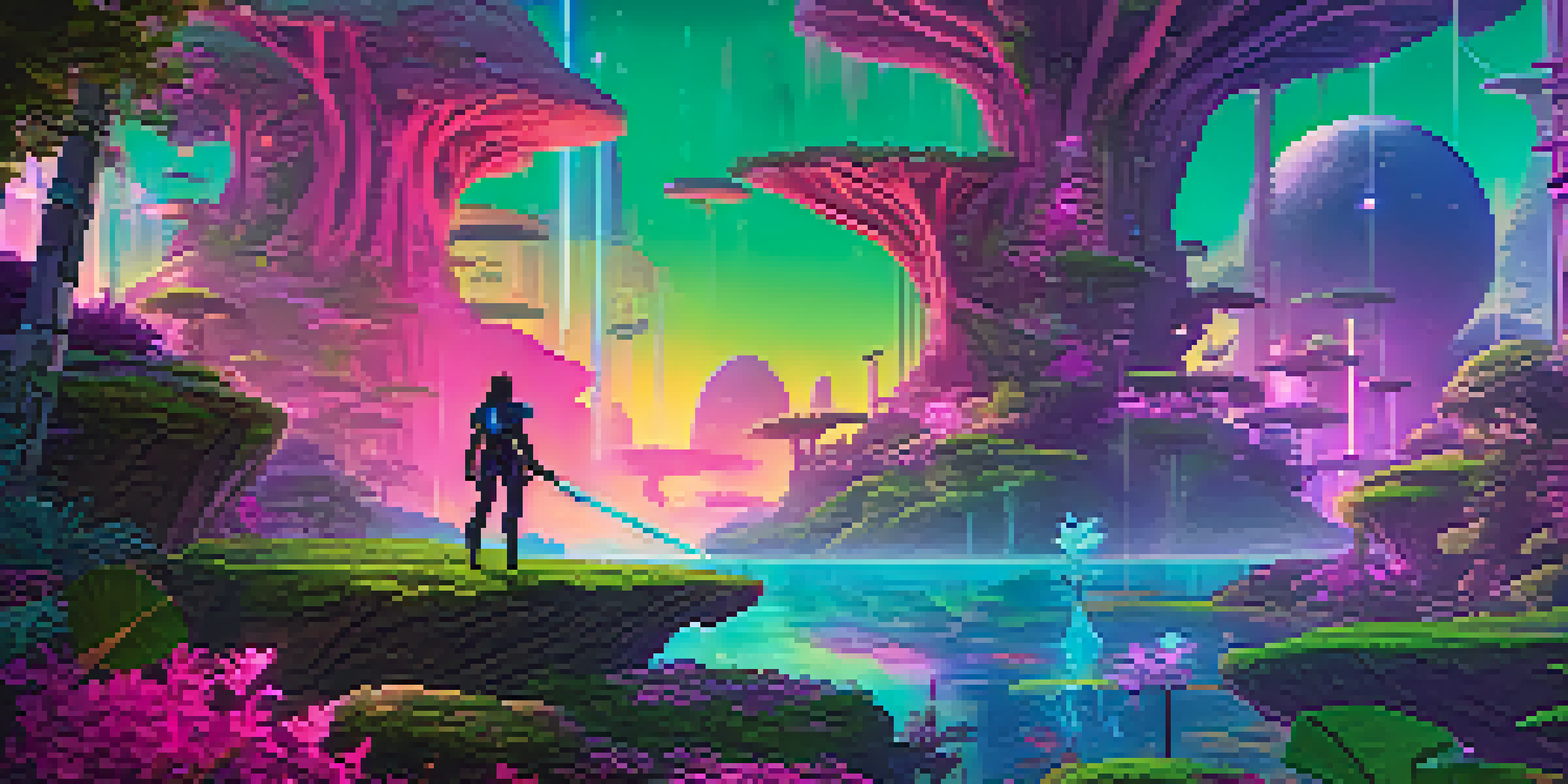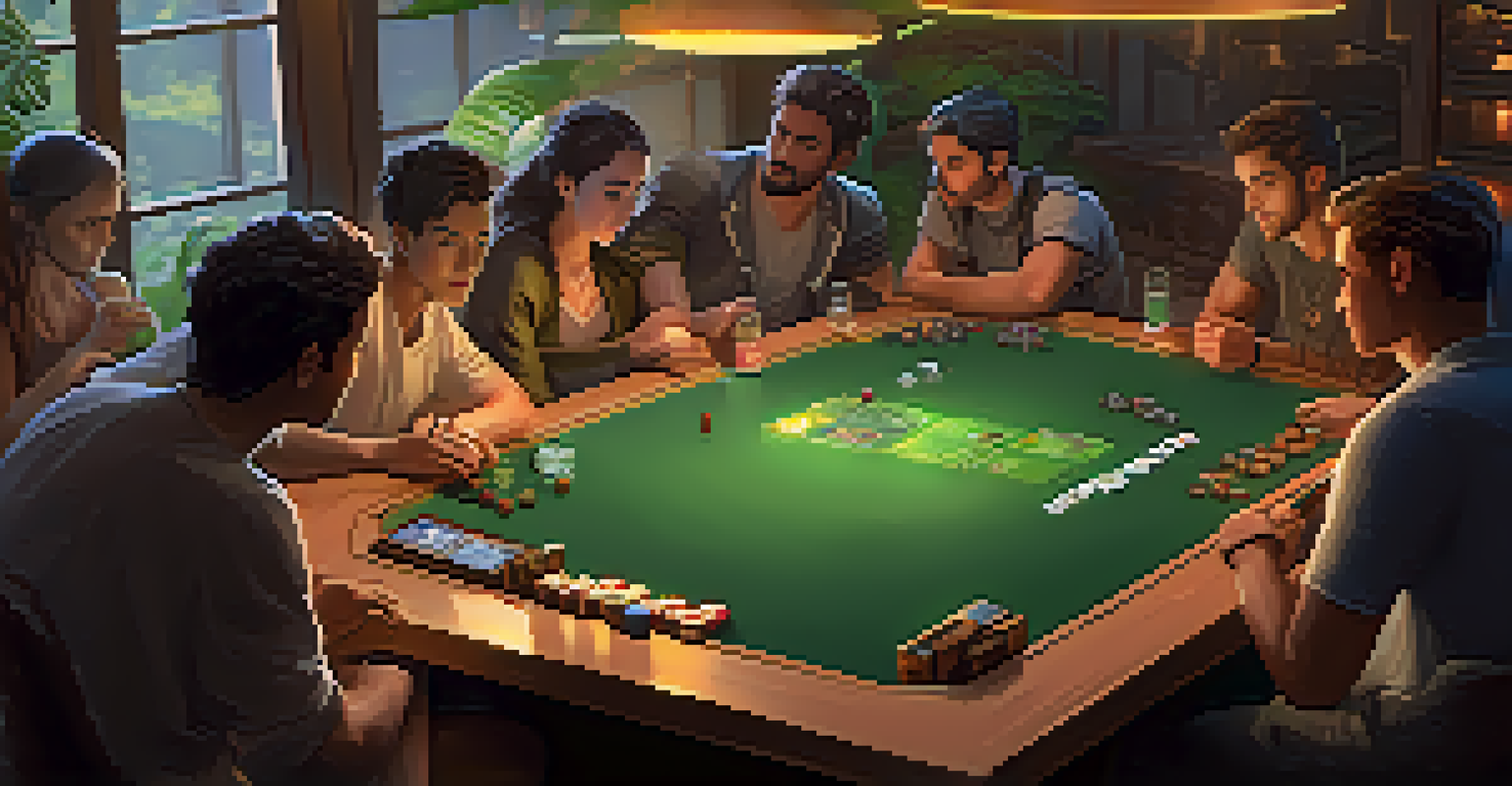Blockchain Gaming: Bitcoin's Integration with Digital Assets

Understanding Blockchain Gaming: A New Frontier
Blockchain gaming is revolutionizing the gaming industry by integrating decentralized technology. Unlike traditional games, blockchain games enable players to truly own their digital assets through unique tokens. This shift represents a significant change in how we interact with virtual worlds and the assets within them.
Blockchain is the tech. Bitcoin is merely the first mainstream manifestation of its potential.
At the core of blockchain gaming is the concept of non-fungible tokens (NFTs), which allow players to buy, sell, or trade in-game items securely. For instance, consider a game where you can acquire a rare sword that not only enhances your character but can also be sold on various marketplaces. This ownership empowers gamers and adds real-world value to their time spent in these digital spaces.
Moreover, blockchain eliminates the need for intermediaries, meaning players can engage in direct transactions. This can lead to a more rewarding experience, as gamers can recoup some of their investments back in the form of digital currency or assets, making gaming not just a pastime, but a potential source of income.
The Role of Bitcoin in Blockchain Gaming
Bitcoin, the first and most recognized cryptocurrency, plays a significant role in blockchain gaming. Its integration allows players to buy and trade digital assets directly within games while using a currency that many are already familiar with. This seamless transition enhances user experience and simplifies transactions.

For example, imagine playing a blockchain-based game where you earn Bitcoin by completing quests or winning battles. This not only adds an exciting layer to gameplay but also incentivizes players to engage more deeply with the game. As players accumulate Bitcoin, they can utilize it within the gaming ecosystem or exchange it for other cryptocurrencies or fiat money.
True Ownership with NFTs
Blockchain gaming allows players to own and trade digital assets, giving real-world value to in-game items.
Additionally, Bitcoin's secure and transparent transaction process builds trust among gamers. Players can verify ownership and transaction history, minimizing the risk of fraud, which has been a concern in traditional gaming environments. This security fosters a more enthusiastic and engaged gaming community.
Digital Assets: Expanding the Gaming Economy
Digital assets in blockchain gaming are revolutionizing how players perceive value. Traditional gaming often limits the worth of items to their in-game use, but blockchain allows these assets to have real-world value. This creates a thriving economy within the gaming world.
The future of gaming is not just about entertainment; it's about ownership and the economy of virtual goods.
Take, for instance, a rare skin in a popular game that can be bought with Bitcoin. If the skin is highly sought after, its value may increase over time, allowing players to potentially sell it for a significant profit. This economic model empowers players and rewards them for their engagement.
Moreover, digital assets can be used across different games, leading to a more interconnected gaming experience. For example, a character or item from one game might be used in another, enhancing the value of digital ownership and creating a vibrant marketplace for trading assets.
The Benefits of Decentralization in Gaming
Decentralization is a cornerstone of blockchain technology, and its benefits in gaming are profound. By removing central authorities, players have greater control over their gaming experiences and digital assets. This fosters a sense of community and encourages collaboration among gamers.
In decentralized games, developers and players can work together to create a more balanced and enjoyable gaming environment. For instance, players can propose changes and improvements directly, leading to a game that evolves based on community feedback. This participatory approach can enhance player satisfaction and retention.
Bitcoin Enhances Gameplay
Integrating Bitcoin into blockchain games simplifies transactions and incentivizes players through earning opportunities.
Additionally, decentralization reduces the risk of server downtime or game shutdowns. Players can continue to access their assets regardless of a single entity's decisions, ensuring that their investment of time and money is safeguarded.
Challenges Facing Blockchain Gaming
Despite its promising potential, blockchain gaming also faces several challenges. One major concern is the scalability of blockchain technology. As more players join, the network can become congested, leading to slower transaction times and higher fees.
Another challenge is the environmental impact of blockchain transactions, particularly with proof-of-work systems like Bitcoin. The energy consumption associated with mining and transactions has raised eyebrows, prompting discussions about sustainable alternatives. Addressing these concerns is crucial for the long-term viability of blockchain gaming.
Lastly, the complexity of understanding blockchain and cryptocurrency can be a barrier for some players. Educational initiatives will be essential to ensure that gamers feel comfortable navigating this new landscape. Simplifying the onboarding process can help foster inclusivity in blockchain gaming.
The Future of Blockchain Gaming and Bitcoin
Looking ahead, the future of blockchain gaming appears bright, especially with the continued integration of Bitcoin. As technology evolves, we can expect more innovative gaming experiences that leverage the strengths of blockchain. This could lead to an explosion of creativity and engagement within the gaming community.
Future developments might include enhanced interoperability between games, allowing assets to be used across multiple platforms. Imagine a scenario where you can take your Bitcoin-earned character from one game and use it in another, seamlessly blending different gaming worlds. This interconnectedness could redefine how we view gaming ecosystems.
Decentralization Empowers Players
Decentralization in gaming fosters community involvement and protects player investments by eliminating central control.
Furthermore, as more players become familiar with cryptocurrencies, the gaming industry may witness a shift towards decentralized finance (DeFi) solutions. This could open up new ways for gamers to earn, invest, and grow their digital wealth, making blockchain gaming an increasingly appealing option for a broad audience.
Conclusion: Embracing the New Era of Gaming
In conclusion, blockchain gaming represents a significant shift in the gaming landscape, with Bitcoin playing a vital role in its evolution. The integration of digital assets and decentralized principles not only empowers players but also creates new economic opportunities within virtual worlds. It's an exciting time to be a gamer.
As we embrace this new era, it's essential to stay informed and engaged with developments in the space. Whether you’re a casual player or a hardcore gamer, understanding the implications of blockchain can enhance your experience and open up new avenues for enjoyment and revenue.

Ultimately, the fusion of blockchain technology, Bitcoin, and gaming has the potential to create a more equitable and rewarding gaming experience. So, get ready to explore this dynamic frontier where your gaming adventures can translate into real-world value!